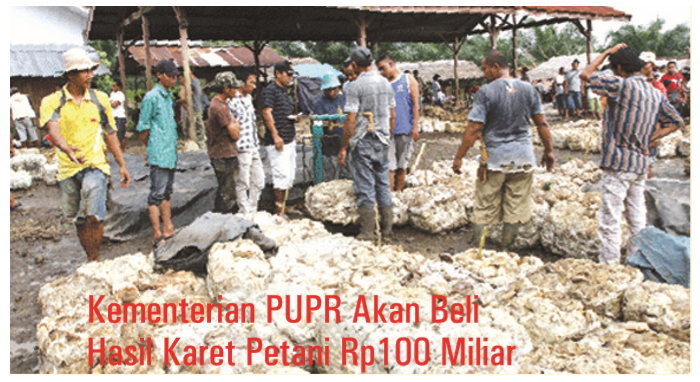The steps of the Ministry of Public Works and Public Housing made a policy to buy rubber farmers received appreciation from the House of Representatives.
The Minister of Public Works and Public Housing Basuki Hadimuljono said that in refocusing activities to mitigate the impact of COVID-19, the PUPR Ministry also carried out rubber purchases directly from farmers with a budget allocation of Rp100 billion. In a Virtual Work Meeting with Commission V of the Indonesian House of Representatives on Tuesday (4/21/2020) Basuki said that the purchase of rubber directly from farmers as a mixture of rubber asphalt was carried out in some rubber-producing areas, such as Lampung, South Sumatra, Jambi, East Kalimantan, South Kalimantan and West Kalimantan.
On the same occasion, Members of the House of Representatives Commission V of the Indonesian Democratic Party of Struggle Faction H.M. Rifqinizami Karsayuda said that with the populist statement in the past week, many of the rubber farmers had come to see the commitment of the Ministry of PUPR to buy rubber from farmers.
Rifqinizami asked for the funds to be distributed proportionally directly to the regions where rubber farmers are located, including in South Kalimantan for the lowest economic stability of the small people.
Besides, the House of Representatives Commission V also agreed with the Ministry of Public Works and Public Housing to prioritize and accelerate the realization of cash-intensive or community-based infrastructure (IBM) programs to mitigate the impact of COVID-19.
In 2020, the cash-intensive work program (PKT) budget is allocated as much as Rp10.22 trillion to increase people’s purchasing power and reduce unemployment, especially in rural areas.
The PKT program includes the development of regional socio-economic infrastructure (PISEW), urban slum structuring (KOTAKU), accelerated development of irrigation water use (P3TGAI), creation of aquifers made by rainwater storage (ABSAH).
Then, the construction of waste management sites reduce, reuse, recycle (TPS 3R), routine maintenance of roads and bridges, provision of community-based drinking water and sanitation (Pamsimas) and community-based sanitation (Sanimas), as well as self-help stimulant assistance.
Rifqinizami added that if the cash-intensive program could be realized immediately, it could become an economic stimulus factor throughout Indonesia because it prioritized self-management and labour-intensive.
Similarly, Members of the House of Representatives Commission V from the Hamka Baco Party faction Baco Kady also appreciated the steps of the Ministry of PUPR to present cash-intensive programs in various regions during the COVID-19 pandemic.
Basuki added that the Ministry of Public Works and Public Housing would also purchase 800 tons of Perhutani resin production for road markings. In addition, there is a fiscal stimulus in the housing sector and housing subsidies in the form of interest difference subsidies and down payment assistance with a target of 175,000 units of Rp1.5 trillion. ***
Bisnis.com, 22/04/2020

